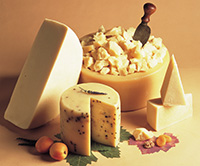U.S. Senate Warns Europeans to Stop Food Fight Over Dairy Names
March 11, 2014
 A bipartisan majority of the U.S. Senate weighed in this week on the importance of rejecting European Union efforts to restrict the use of common food names, including a variety of popular, well-known cheeses, used by U.S. dairy producers and companies.
A bipartisan majority of the U.S. Senate weighed in this week on the importance of rejecting European Union efforts to restrict the use of common food names, including a variety of popular, well-known cheeses, used by U.S. dairy producers and companies.
In a letter to U.S. Trade Representative (USTR) Michael Froman and U.S. Agriculture Secretary (USDA) Tom Vilsack, over 50 U.S. senators urged the U.S. government to fight back against EU efforts to restrict how U.S. companies market cheese and other foods. Under the guise of protecting European geographical indications (GIs), EU has been using free trade agreements to prevent cheese makers in the United States and around the world from using common food names such as parmesan, feta, havarti, muenster and others.
The U.S. Dairy Export Council (USDEC) and National Milk Producers Federation (NMPF) applaud the Senate’s strong statement in support of the U.S. dairy industry, as it comes at a critical time in the development of a free trade agreement between the U.S. and the EU.
The letter, coauthored by Sens. Chuck Schumer (D-NY) and Pat Toomey (R-PA), expressed opposition to the EU’s gratuitous use of GIs as a protectionist measure, and condemned the resulting barriers to trade that are growing in key U.S. export markets. The senators asked that USTR and USDA work aggressively against the EU’s efforts to restrict commonly used cheese names because they would harm the ability of U.S. businesses to compete domestically or internationally.
“Over the past five years, U.S. cheese exports have been growing by an average of 40% annually, leading to a record high of $1.4 billion in U.S. cheese sales abroad last year,” said Tom Suber, president of USDEC. “Last year, the United States became the largest single country cheese exporter in the world. So it’s vital to ensure that unfounded barriers to trade do not hinder this continued growth path for our industry.”
“For consumers both here and abroad, the consequences of limiting familiar food names to just a few regional suppliers would be higher costs, fewer choices and greater confusion,” said Jim Mulhern, president and CEO of NMPF. “No one country has any right to own common food names for their exclusive use. U.S. businesses should have the opportunity to offer their award-winning products, and let consumers decide what they want to buy.”
“This is why the work of the Consortium for Common Food Names (CCFN), an independent organization USDEC founded two years ago, is so important,” elaborated Suber. “CCFN allows those with similar concerns about this issue in various countries to unite in order to promote a more common-sense and pro-trade approach to GI policies.”
Mulhern agreed, asserting, “It is American food companies that have helped popularize many cheeses with old world origins, leading to increased sales for all. The Senate’s message about the threat to U.S. dairy farmers and cheese makers posed by this outrageous proposed trade barrier reinforces the importance of our work.”
The U.S. Dairy Export Council (USDEC) is a non-profit, independent membership organization that represents the global trade interests of U.S. dairy producers, proprietary processors and cooperatives, ingredient suppliers and export traders. Its mission is to enhance U.S. global competitiveness and assist the U.S. industry to increase its global dairy ingredient sales and exports of U.S. dairy products. USDEC accomplishes this through programs in market development that build global demand for U.S. dairy products, resolve market access barriers and advance industry trade policy goals. USDEC is supported by staff across the United States and overseas in Mexico, South America, Asia, Middle East and Europe.
The National Milk Producers Federation (NMPF), based in Arlington, Va., develops and carries out policies that advance the well-being of U.S. dairy producers and the cooperatives they collectively own. The members of NMPF’s cooperatives produce the majority of the U.S, milk supply, making NMPF the voice of nearly 32,000 dairy producers on Capitol Hill and with government agencies.
Download





